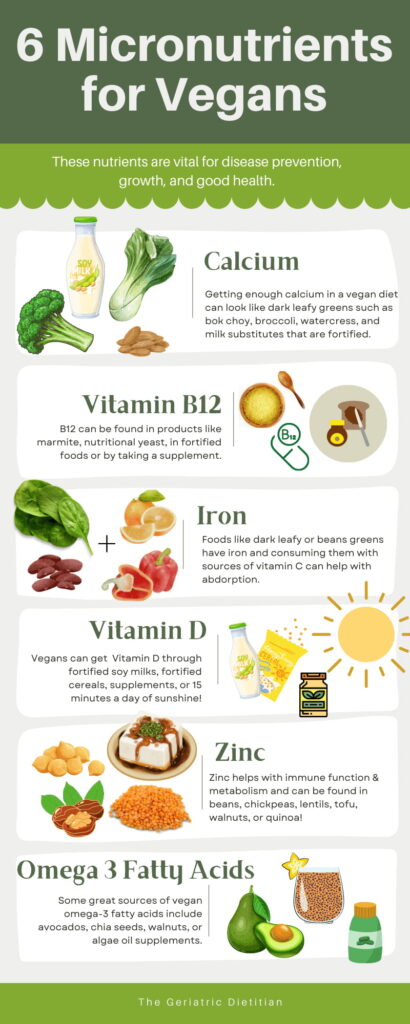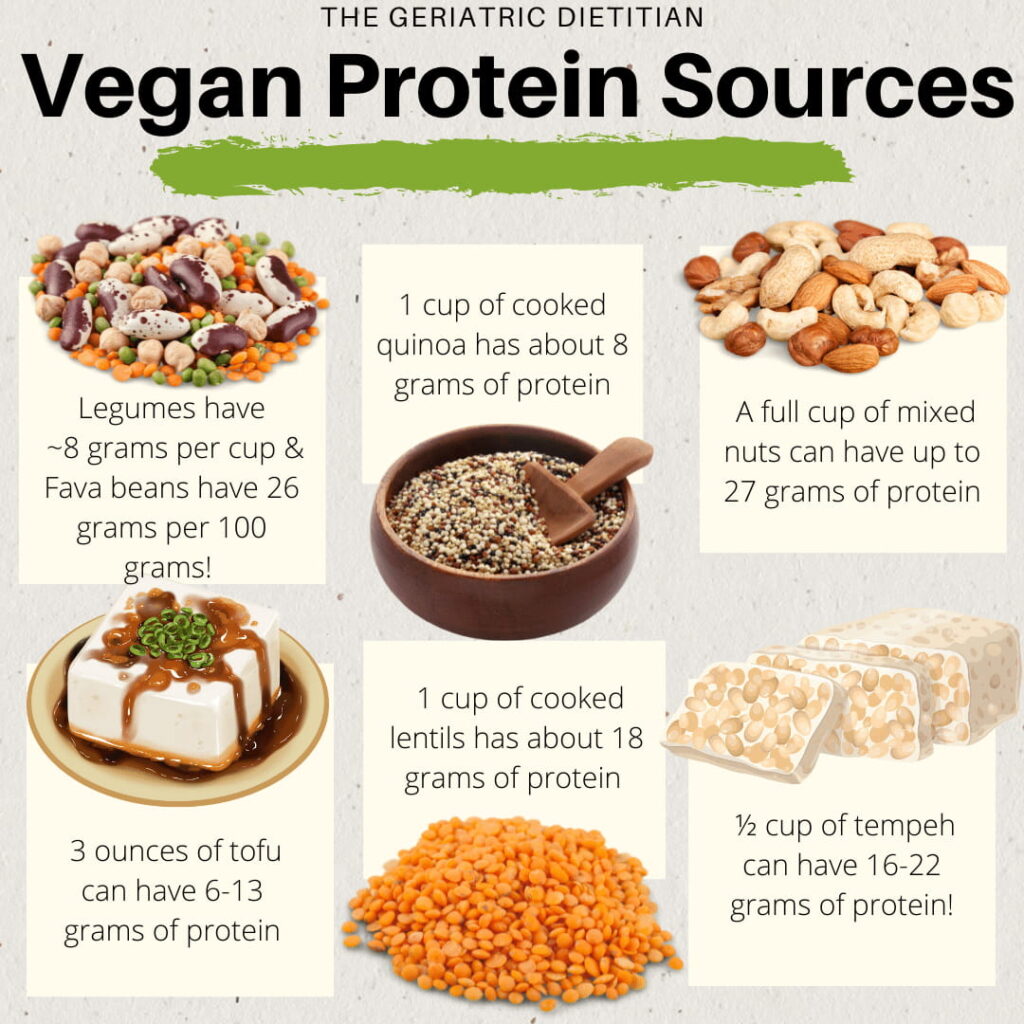Easy High Protein Vegan Breakfast Ideas
“Easy High Protein Vegan Breakfast Ideas” was written by Erin Washbon edited/reviewed by Aly Bouzek, MS, RDN. Erin is a dietetic intern at Oregon Health Sciences University.
What Should Be In a Balanced Vegan Breakfast?
Breakfast is the most important meal of the day! But how are you supposed to get enough protein without eating meat or animal products?
A balanced vegan breakfast consists of whole foods, plenty of protein to keep you full, and fiber for a gradual release of energy.
Micronutrients are vitamins and minerals that are needed by the body. They help support immune function, a healthy metabolism, and much more. A deficiency in any of them can cause illness.
Keep reading to learn more about easy high protein vegan breakfast ideas!
What Micronutrients Are Missing From a Vegan Diet?
Calcium
In a traditional westernized diet, Calcium intake is usually from dairy products such as milk, cheese, and yogurt. Getting enough calcium in a vegan diet can look like dark leafy greens such as bok choy, broccoli, watercress, and milk substitutes that are fortified.
Fortification means that important vitamins and minerals are added to those products.
B12
B12 is a trickier nutrient to get into a vegan diet. Naturally, it is only found within animal products such as meat, milk, and eggs. B12 can be found in products like marmite, nutritional yeast, in fortified foods, or by taking a supplement.
Iron
Iron can be found in many food items that may already be a part of a vegan diet! Foods like dark leafy greens have iron, and it’s important to know that consuming those sources of iron with some vitamin C can help with absorption.
Good sources of Vitamin C include citrus fruits like oranges, strawberries, or even bell peppers!
Check out our iron supplement article here, to learn more!
Vitamin D
Vitamin D helps with countless bodily functions including bone health and metabolism. It’s crucial because it increases the absorption of other micronutrients such as magnesium, calcium, and phosphorus.
Vegans can get adequate amounts of Vitamin D through fortified soy milks, fortified cereals, supplements, or 15 minutes a day of sunshine!
Zinc
Zinc helps with immune function and metabolism and can be found in beans, chickpeas, lentils, tofu, walnuts, or quinoa!
Omega-3s
Omega-3 fatty acids are important for every cell in your body, but your body can’t make them on its own. Therefore, we must get them from our diet!
Omega-3s also support a healthy vascular and immune system. (1) Some Omega-3 fatty acids can be found in fish (EPA and DHA) and some are found in plant foods (ALA).
ALA is an important precursor to EPA and DHA, but very little of it is actually made into those other forms.
Some great sources of vegan omega-3 fatty acids include avocados, chia seeds, walnuts, or algae oil supplements.

Macronutrients For a Balanced Vegan Breakfast
Macronutrient balance is important to maintain your energy levels throughout the day! Making sure you are getting enough carbohydrates, fats, and protein will make you feel energized and productive all day long!
Carbohydrates: Carbohydrates at breakfast are important to fuel your brain and give you the energy to start your day! Pairing carbohydrates with protein can help to slow the metabolism of the sugars, providing a steady supply of energy.
Some examples of carbohydrates for breakfast include: oatmeal, quinoa, pancakes, fruits, and cereals.
Fats: Fats are also important for brain health! Carotenoids and vitamins like A, D, E, and K are fat-soluble, meaning they need to be paired with a fat source in order to be absorbed by the body.
Fat also helps to slow digestion and metabolism of sugars, and can even play a role in immune function.
Some good sources of fat to include in your breakfast include: avocado, chia seeds, flax seeds, nuts, nut butter, and even vegetable or olive oil.
Protein: Protein keeps your muscles strong and your heart healthy. Getting enough protein in every day helps to regulate satiety hormones, meaning it can help you feel full for longer.
Vegan protein breakfast options are found below, and this link will take you to some high protein vegan meal ideas.
Complete Protein vs Incomplete Protein?
A complete protein has all nine essential amino acids required for the body to function. An incomplete protein does not. Most complete proteins are found in animal products but not all!
Quinoa, amaranth, buckwheat, Ezekiel bread, and nutritional yeast are all complete sources of protein on their own.
Pairing certain plant foods together will also make up a complete protein. Some examples of plant proteins that make a complete protein when combined are: rice and beans, pita and hummus, and peanut butter and whole-grain crackers.
Check out our article on Vegan Protein Sources to learn more.
So… What Can Vegans Eat for Breakfast Instead of Eggs?
There are many brands of vegan egg substitutes on the market that come in powder, liquid, and hardboiled forms! These egg alternatives taste, feel, and look just like the original. These products also have a similar amount of protein when compared to true eggs.
Along with egg substitutes, breakfast meat substitutes have come a long way in recent years. Food scientists have invested in this market due to the growing demand for meatless alternatives.
There are meat substitutes for anything from breakfast sausage to fish filets.
There are also lots of whole foods and plant-based food options that don’t require a vegan substitution.
How Can Vegans Eat High-protein Foods on a Regular Basis?
As we’ve talked about above, protein is important for a balanced diet and there are many vegan options. Here are some pantry staples to have in your kitchen so you’ll always have a protein option!
Vegan foods high in protein (with relevant nutrition info):
Legumes have an average of 8 grams of protein per cup. Fava beans have the highest amount of protein among the legume’s category with 26 grams of protein per 100 grams!
Tofu, tempeh, edamame: There are many variations of soy products that are great sources of vegan protein.
3 ounces of tofu can have 6-13 grams of protein. 8 ounces of soy milk can have 3 to 10 grams of protein. ⅔ cup of sweet soybeans can have 7-9 grams of protein, and ½ cup of tempeh can have 16-22 grams of protein.
Beans: 1 serving or ½ cup of cooked beans can provide about 7 grams of protein – comparable to a serving of meat.
Nuts: one serving of almonds or ¼ cup can have up to 7 grams of protein. A full cup of mixed nuts can have up to 27 grams of protein.
Lentils: 1 cup of cooked lentils has about 18 grams of protein.
Nutritional Yeast: 2 tablespoons of nutritional yeast contains about 8 grams of protein.
Quinoa: 1 cup of cooked quinoa has about 8 grams of protein.

What Protein Should Vegans Eat for Breakfast?
Many vegan meals consist of starch, fiber, and protein. Some vegan breakfasts can fit into all three categories! This equation can be used in an endless variety of combinations for balanced high protein vegan breakfast options.
Here are a few ways that these pieces of a meal can make high-protein vegan breakfast recipes that you’ll never get tired of:
Breakfast bowls and burritos are an easy way to throw together a balanced meal by prepping basic ingredients each week. You can even use leftovers from other meals to cut down on time spent in the kitchen.
The base of the bowl or burrito can be made out of quinoa, oatmeal, potatoes, rice, beans, or lentils. Many of these options are high in fiber and protein, and a few of them are complete protein sources!
The starch of a breakfast bowl can be anything from the rice, also used as the base, or added vegetables like corn, potatoes, or peas. For a burrito, a vegan wheat wrap is a great addition of whole grains.
A protein source for a bowl or burrito can also be the quinoa, beans, or lentils used as a base. Vegan eggs, tofu, tempeh, or meat substitutes can also be added.

Resources:
- Omega-3 Fatty Acids. Cleveland Clinic. https://my.clevelandclinic.org/health/articles/17290-omega-3-fatty-acids.
